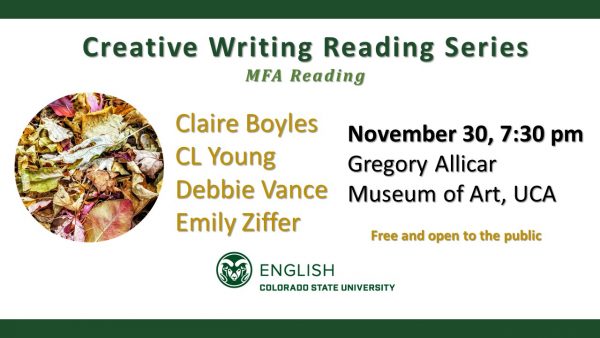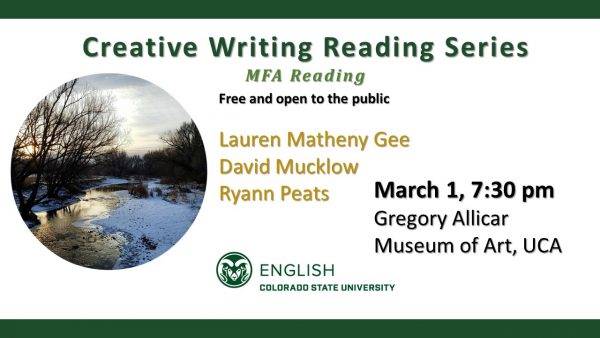At the end of November, four MFA students wrapped up the semester’s Creative Writing Reading Series for Fall 2017 in a stellar performance at the Visual Arts building. By the time the reading began, the walls of the lecture hall were lined with students, faculty, and community members alike.
The first reader, fiction writer Claire Boyles, took the microphone after a brief introduction. Boyles is a mother, wife, K-12 teacher, and MFA student. Before beginning to read, she acknowledged the presence of her husband and two young children in the audience.
Claire’s story exudes warmth, intellect, and heart. It takes place in rural Colorado, centering around an ornithologist, Nora, who had recently moved back home to her aging father’s farm in order to care for him after a recent stroke. The plot alternates between the narrator’s relationship with her father and relationship with the environment. The Sage Grouse (a kind of bird) around the narrator’s family farm had recently become endangered and Nora was on a quest to save them. Nora’s maternal protectiveness towards nature was both refreshing and inspiring– in today’s political state, we could all stand to be a little bit more protective of our natural world.
The next reader was Emily Ziffer, warmly introduced by CSU English professor Andrew Altschul. Ziffer is also a fiction writer in the MFA program, but her background is considerably different from Boyles’s, or any other person’s, probably. Ziffer graduated from Tufts University with a dual degree in International Affairs and Russian. Outside of being a writer, Ziffer has worked at a slew of organizations, both in the States and in Russia, and somehow also found time to become an internationally ranked rock climber.
Ziffer’s story features a young woman who had just gotten out of a serious relationship now living in St. Petersburg, Russia and working as a person who passes out coupons at the metro station. I don’t trust myself to recapture the wit and tone of the story in my own words. Emily’s writing flows beautifully, tempestuously, embracing its own turbulence. Her humor is off-kilter and hilarious and her characters represent the human condition in a way sometimes too close for comfort. The story was a treat to listen to in and of itself, but it also touches on aspects of life that are tough to grapple with, such as love, loneliness, and how to reconcile the two.
The next reader, Debbie Vance, touched on similar themes but through a very different approach. Vance was the third and final fiction writer of the night. Her story focuses on a struggling young artist who goes home to Missouri in order to save her electively mute brother from eviction. She has not seen her brother, Simon, in five years but goes on the insistence of her boyfriend. The story oscillates between the narrator’s strained relationship with her brother, her strained relationship with herself and her past, and her strained relationship with her oblivious boyfriend. Vance seemed to have poured raw emotion into the story, creating an exceptionally moving and unique piece.
CL Young was the final reader of the night and the only poet. She was introduced by Dan Beachy-Quick, in the slow, drawling voice of a poet. He spoke of her ability to strip the human condition down to its bones, in a way that only poets can. She opened her reading with several minutes of heartfelt thank-yous to the people in her life. Young is funny, warm, and personable. Her poems oscillate between the specific and the general and capture large, large feelings in the space in between. She writes about broad themes such as living as a woman in America, but she is also personal in her use of colloquialisms and anecdotes in a way that is very hard not to appreciate. Her vision of the world flows through each poem, just in different words each time.
Join us for our next reading. Another group of MFA readers: Lauren Matheny Gee, David Mucklow, and Ryann Peats. Thursday, March 1, 7:30 pm, Gregory Allicar Museum of Art, University Center for the Arts.

